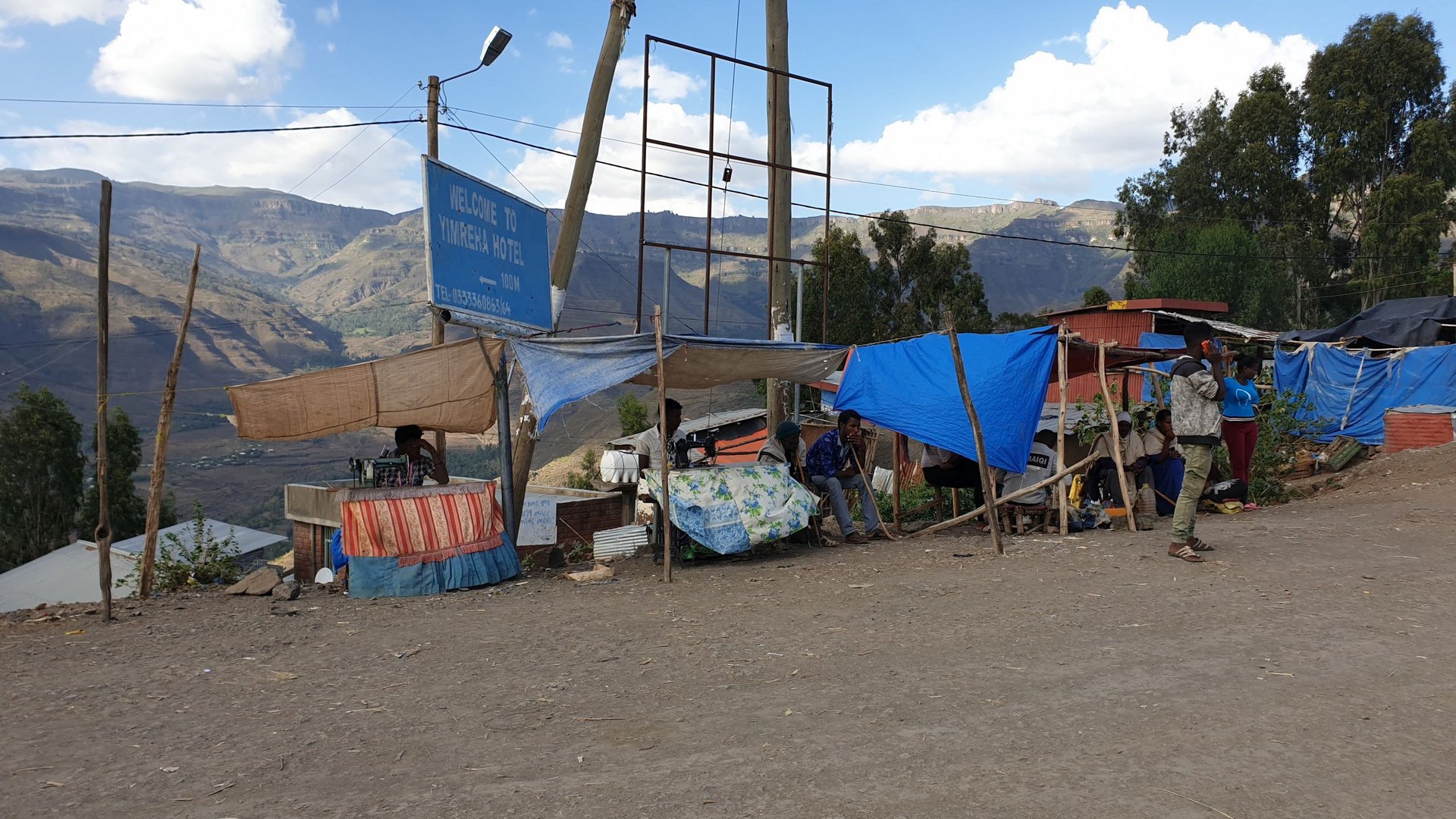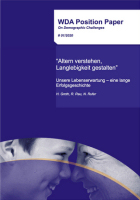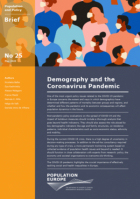Die Arbeitsbevölkerung in der Schweiz nimmt ab: Die Wirtschaft erhält eine neue Herausforderung
Sven Bättig und Hans Groth
2024 ist für die demografische Entwicklung in der Schweiz ein einschneidendes Jahr: Die Zahl der Erwerbstätigen erreicht ihren Höhepunkt. Ab 2025 ist mit einer Abnahme zu rechnen. Doch was bedeutet eine schrumpfende Arbeitsbevölkerung für das langfristige wirtschaftliche Wachstum und den Wohlstand der Schweiz? Müssen wir diese Entwicklung einfach hinnehmen oder gibt es Antworten und Lösungen?
Demography – Impact on National Security and Development: Case Study «Ukraine»
Martin Dahinden, Hans Groth, Max Huenges
World Demographic & Ageing Forum (WDA Forum), St. Gallen, Switzerland
September 2021 - WDA Discussion Paper
«Demografie: Instrument mit Potenzial für Politik und Wirtschaft»
27.-28. September 2021, Lilienberg
«Die Demografie hat das Potenzial, wichtige Herausforderungen unseres Planeten besser zu lösen. Sie erlaubt einen weiten Blick in die Zukunft der Menschheit und lässt Chancen und Risiken früh erkennen. Das wird allerdings noch wenig getan. Weshalb ist das so? Welches ist das ungenutzte Potenzial?»
Der 4. WDA Executive Workshop setzte sich intensiv mit dem Potenzial demografischer Analysen auseinander und ging auf folgende 4 Fragen vertieft ein:
- Worin besteht dieses Potenzial und wie wird es vermittelt?
- Warum wird dieses Potenzial nicht besser genutzt?
- Was verpassen wir in Wirtschaft und Politik, wenn wir dieses Potenzial nicht nutzen?
- Wie kann demografisches Wissen in Zukunft besser nutzbringend zur Anwendung gebracht werden?
Lesen Sie unser Summary mit einem Vorwort von Dr. Daniel Möckli, Chef Policy Planning, Eidgenössisches Departement für auswärtige Angelegenheiten (EDA).
English-Introduction - Paper in German available only!
«Demography has the potential to help us better respond to important challenges facing our planet. It offers a broad view into the future of humankind – opportunities and risks can be identified early on. However, little is being done about this possibility. Why is that so and what is the untapped potential?»
At the 4th WDA Executive Workshop, intensive discussions about the potential of demographic analyses were held around the following 4 questions:
- What is the potential and how is it communicated?
- Why is this potential not better realized?
- What are we missing out in business and politics?
- How can demographic knowledge be put to better use in the future?
Read our summary (in German only) with a foreword by Dr. Daniel Moeckli, Head of Policy Planning at the Federal Department of Foreign Affairs (EDA).
# 05/2021 - WDA Discussion Paper

«Switzerland's Development Strategies for Sub-Saharan Africa»
A View through the Lens of Demography by Ziqian Feng
In international development cooperation demographic approaches tend to be neglected – to the detriment of sustainable development. Despite the many studies, conceptual considerations and analysis are only in an early stage. As such, demography today occupies a surprisingly small place in international development policy debates.
This opens the field for new ideas and for thinking outside the box. One potential starting point is Ziqian Feng’s Master’s thesis at the University of St. Gallen, 2020, in which she tries to apply a demographic lens to answer the following question:
“To what extent do development strategies capture the upcoming demographic dividend in Nigeria, Democratic Republic of the Congo and Ethiopia?”
The WDA Discussion Paper 05/2021 by Ziqian Feng is a condensed version of this thesis.
Download WDA Discussion Paper
Foreword: Martin Dahinden & Jack Goldstone
# 05/2021 - Foreword

Martin Dahinden
Member of the Board of Directors,
WDA Forum, St. Gallen, Switzerland
Demography and related population dynamics have a major impact on the development opportunities of poorer countries. It is important and urgent to make wise use of the opportunities that arise with population development. On such aaproach concerns the so-called "demographic dividend". It calls for making good use of the period in which the population has a relatively high number of young people of working age, well before the aging of the society sets in.
One potential starting point is Ziqian Feng’s Master’s thesis at the University of St. Gallen, 2020, in which she tries to apply a demographic lens to answer the following question:
«To what extent do development strategies capture the upcoming demographic dividend in Nigeria, Democratic Republic of the Congo and Ethiopia?»
Ziqian Feng's paper gives a condensed answer to this question.
# 05/2021 - Foreword

Jack A. Goldstone
Hazel Professor of Public Policy
George Mason Uniersity,
Arlington, VA, USA
Ziqian Feng shows how four different elements – supporting health, particularly women’s health and family planning; expanding education, particularly secondary education; providing local employment opportunities; and facilitating migration to help workers move to where capital and jobs are available—are all necessary and interlocking parts of a strategy to produce a full demographic dividend.
«Her essay is a valuable guide to developing the broad strategy needed to ensure that global economic growth remains strong as the world’s growth potential shifts to Africa over the 21st century!»
# 04/2021 - WDA Discussion Paper
3. WDA Executive Workshop, Lilienberg 2020
Summary
"Altern verstehen - Langlebigkeit gestalten"
Bevölkerungsdiversität und ihre Folgen
Patrick Friedli, Lucas Binggeli, Hans Groth
Vorwort: Roland Rau
# 03/2020 - WDA Discussion Paper

«The Power in Demography»
Unlocking the Value of Health
Patrick Friedli, Lucas Binggeli, Pol Vandenbroucke and Hans Groth
Foreword: Thomas Zeltner
«The Power in Demography - Unlocking the Value of Health»
Longevity is one of the greatest achievements in human history. The reasons for ever longer life spans are multiple, with public health, healthcare and continuous improvements in medical treatments being key drivers for this success story in the past, present and future. But it is not just about treatment provision – at least as important is broad access to preventive care and healthy living conditions across all parts of society in developed, emerging and developing countries.
Newsletter Release:
In the WDA Discussion Paper #3, longevity dynamics of 18 selected countries representing 57% of the world population and almost 70% of the global GDP in 2020 were analyzed. By using the novel “Demographic Heat Map” approach a new understanding of the human longevity evolution over the past decades could be generated. This novel strategic tool helps policy makers, industries and businesses in their efforts to add value for a longer and better life – based on longevity-shaped population dynamics.
Learn more about Demographic Heat Maps and the Value of Health!
Key Insights:
● The proportion of the world population aged 65+ will nearly double in the coming 30 years, from 9% in 2020 to 16% in 2050. By 2100 the proportion aged over 65 will increase to 23%. The world will then have the same age structure already seen in Japan in 2012.
● In the past decades life expectancy at birth (LE) has grown faster than healthy life expectancy at birth (HALE).
● The ultimate goal is for healthy life expectancy to grow at a higher rate than overall life expectancy. Therefore, the focus of progress has to be on a further expansion of active lives by reducing the burden of disease, including communicable and non-communicable morbidities. Besides innovations from pharmaceutical research, digital technology such as big data, artificial intelligence and machine learning represent unprecedented potential.
● In developed countries the main target for the health industry are the growing 60+ age groups, who aim to live longer in good health and have the financial resources to spend more on personal health.
● In developing countries, the industry’s focus should be on growing populations - particularly working-age populations.
# 03/2020 - Foreword

Nicholas N. Eberstadt,
Henry Wendt Chair in Political Economy,
American Enterprise Institute, Washington D.C.
"Great Escape" - The wold's population is over four times larger today than a century ago!
Demographics is central to the "Great Escape", and demography is a discipline that can help abet it. The WDA's Paper "The Power in Demography" is an exemplary illustration of how careful thinking, aided by useful new analytical tools such as "Demographic Heat Maps", can contribute to just such a process.
This valuable paper introduces a new pathway for explorations by both researchers and practitioners. There is great promise to this investigation - and the questions this paper raises are just a beginning!
# 03/2020 - Foreword

Professor Thomas Zeltner,
Visiting Scientist, Harvard School of Public Health, Boston, MA
"The history of humanity is also the history of constant demographic transformation!"
The tool of "Demographic Heat Maps" presented in WDA's Paper "The Power in Demography" adds a new promising instrument for policy makers and business leaders to better understand each local situation and to bring added value to the life of local communities.
Preamble of the Swiss Constituion - the strength of a population is measured by the well-being of its weakest members!
# 02/2020 - WDA Position Paper
«Unlocking a Demographic Dividend in Ethiopia»
How Entrepreneurship Can Help Drive Job Creation
Hans Groth, Vincent Barras and Ziqian Feng
# 02/2020 - Newsletter Release

«Africa’s Development – Take Entrepreneurship Seriously!»
«Unlocking a Demographic Dividend in Ethiopia: How Entrepreneurship Can Help Drive Job Creation» provides important food for thought and gives hope for urgently needed development and wealth creation for Africans.
Ethiopia – Africa's second largest country by population - is in a challenging situation: on the one hand, with an annual gross national income of around USD 922 per capita, it is one of the poorest countries in the world, which is exacerbated by a population growth rate of 2.4% (2018). On the other hand, its economy is growing solidly (7.7% in 2019) and the government has set up numerous programs to maintain this momentum. One focus is on the privatization and industrialization of its economy. Whether this will succeed will also depend on the extent to which local entrepreneurship can be developed. This development opportunity depends on three factors in particular: (1) development and support of entrepreneurial mindsets in education and the media, (2) supportive state framework conditions for founders (little bureaucracy, start-up centers, digitalization etc.) and (3) expansion of the market for risk capital, also with foreign investors.
In addition, demography offers another unique window of opportunity. A very large part of the population will be of working age, and the ageing of society with its difficult consequences will not yet have begun. To seize the opportunity, millions will have to find work. The key to this is a lively entrepreneurial spirit and entrepreneurial action. Entrepreneurs are looking for needs that they can meet with products and services and thus create prosperity for society. The public sector will be crucial in ensuring that the right framework conditions are in place.
«The paper provides a number of valuable suggestions for strengthening Ethiopian entrepreneurship.»
Dr. oec. publ. Martin Dahinden, Member of the WDA Board of Directors
Prof. em. Dr. Günter Mueller-Stewens, Memver of the WDA Forard of Directors
# 02/2020 - Foreword

Ephrem T. Lemango, (MD, MA), Commissioner Job Creation Commission
Federal Democratic Republic of Ethiopia
«Ethiopia has a window of opportunity to foster entrepreneurs' job creation opportunities if the country capitalizes on its demographic dividend - the youth bulge!»
«Unlocking the Demographic Dividend in Ethiopia: How entrepreneurship can help drive job creation»
# 01/2020 - WDA Position Paper

«Altern verstehen – Langlebigkeit gestalten»
Unsere Lebenserwartung - eine lange Erfolgsgeschichte
Autoren: H. Groth, R. Rau, N. Rufer
# 01/2020 - Infos

«Demography and the Coronavirus Pandemic»
Population Europe – Policy Brief – Issue No. 25/2020
Authors: Nicoletta Balboa, Ilya Kashnitsky, Alessia Melegaro, France Meslé, Melinda C. Mills, Helga A.G. de Valk, Daniela Vono de Vilhena
# 01/2020 - Buchbestellung

«Morgen werden wir 100»
Wie unser langes Leben gelingt
Autoren: Lynda Gratton, Andrew Scott
Buch bestellen für CHF 30.– (inkl. Versand)


